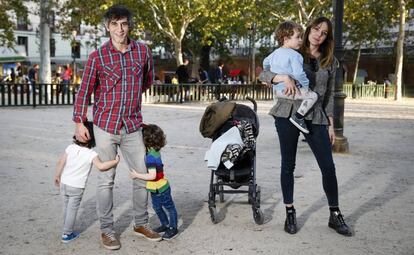Should I speak to my child in English if I am not a native speaker?
More parents are considering communicating in a second language with their children, starting at birth

When Tomás Bastarreche discovered that his wife was pregnant with twins, he was determined that both he and his mother would speak to them in English. “When the time came, my mom couldn’t do it, but it was easy for me,” says Tomás, who spent several summers in the US as a teenager. The twins, Javier and Matilde, now two, understand him despite his marked Spanish accent.

Similarly, Carol Rodríguez has been speaking to her son Eric in English since he was an infant. “Even though I struggled with the language, I love it,” she says. “So I decided to try it out for a few weeks and see how it felt. And it wasn’t bad.”
According to Valeria Ávila, a speech therapist at the Sinews Center in Madrid that runs workshops for parents bringing up bilingual children, talking to your children in another language when you are not bilingual involves a big sacrifice. “It has to be a very clear-cut decision between the parents, so the child knows who is going to speak in which language,” she says.
Talking to your children in another language when you are not bilingual involves a big sacrifice
Both Bastarreche, a lecturer in constitutional law at the Autonomous University in Madrid, and Rodríguez, a flight attendant at Iberia, believe that offering their children the chance to speak English from a very early age will give them a head start in life.
“As my wife says, it’s an investment,” says Bastarreche. “What I can’t do is avoid using expressions that come naturally in Spanish,” he adds, such as venga (come on) or bichito (a term of endearment). “So I’ll says things like, ‘Venga, let’s go to the park’.” “I didn’t want to stop using the affectionate terms that don’t come out naturally if I say them in English,” says Rodríguez. “I’ll say, ‘Bichito, eat a little more’.”
According to trilingual British Council Coordinator María Piperides, the earlier and more often parents speak to their children in English, the better. “You have to keep positive,” she adds. “Children should see that the parents are enjoying using the language – if they do, they’re more likely to try to speak it.”
Javier says things like “Yo promo” instead of “Te lo prometo.” And Matilde comes out with phrases such as “Quiero jumpear” – I want to jump
In Seville, Alex Pérez has been speaking to his two-year-old in English since birth and has recently set up the website crecereninglés as well as an online course for parents.
“I saw there was a need for information,” he says. “So I do 10 sessions with a monthly subscription of €5. I hope to help other parents who are doing the same as me. I’m not a native speaker, so I have my limitations. But it doesn’t matter because he’ll learn more English like this than if I didn’t do it, and one day I know he’ll be better than me.”
One concern he has is what kind of accent his children will have when they grow up. “The parents’ accent doesn’t influence the child’s at all,” says Ávila. “Children are programmed to speak another language and we encourage all parents, whatever their accent, to speak to their kids in English.”
In any case, as Piperides points out, there are many different English accents given that it is an international language. “What they’re doing is simply laying the foundations that will later be built upon,” she says.
Tomás, meanwhile, admits that he is aware of making mistakes sometimes when he talks to his children. “It’s the risk I take,” he laughs. “I hope one day they’ll realize how it’s actually said properly.”
All these parents expect their children to address them in English at some stage. “It would be great if, in the future, they wanted it to be the main language at home, but that’s not necessarily my aim,” says Tomás. His twins have just started to speak and they mix Spanish with English. Javier says things like “Yo promo” instead of “Te lo prometo” – I promise you. And Matilde comes out with phrases such as “Quiero jumpear” – I want to jump – instead of “Quiero saltar.”
But yesterday Carol’s son Eric greeted her with a “Good morning” – and that, she says, has made up for all the odd looks she got in the park when he was a baby.
English version by Heather Galloway.
Tu suscripción se está usando en otro dispositivo
¿Quieres añadir otro usuario a tu suscripción?
Si continúas leyendo en este dispositivo, no se podrá leer en el otro.
FlechaTu suscripción se está usando en otro dispositivo y solo puedes acceder a EL PAÍS desde un dispositivo a la vez.
Si quieres compartir tu cuenta, cambia tu suscripción a la modalidad Premium, así podrás añadir otro usuario. Cada uno accederá con su propia cuenta de email, lo que os permitirá personalizar vuestra experiencia en EL PAÍS.
¿Tienes una suscripción de empresa? Accede aquí para contratar más cuentas.
En el caso de no saber quién está usando tu cuenta, te recomendamos cambiar tu contraseña aquí.
Si decides continuar compartiendo tu cuenta, este mensaje se mostrará en tu dispositivo y en el de la otra persona que está usando tu cuenta de forma indefinida, afectando a tu experiencia de lectura. Puedes consultar aquí los términos y condiciones de la suscripción digital.








































